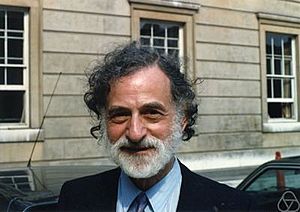Paul Cohn facts for kids
Quick facts for kids
Paul Cohn
|
|
|---|---|

Paul Cohn in 1989
|
|
| Born |
Paul Moritz Cohn
8 January 1924 |
| Died | 20 April 2006 (aged 82) London, England
|
| Alma mater | University of Cambridge |
| Known for | Algebra, concentrating in non-commutative rings |
| Awards |
|
| Scientific career | |
| Fields | Mathematics |
| Institutions |
|
| Doctoral advisor | Philip Hall |
Paul Moritz Cohn (born January 8, 1924 – died April 20, 2006) was a very important professor of mathematics. He taught at University College London and wrote many books about algebra. His main work was in a part of algebra called non-commutative rings. He was also a Fellow of the Royal Society, which is a big honor for scientists.
Contents
Early Life and Moving to England
Paul Cohn was the only child of his parents, James and Julia Cohn. They were both born in Hamburg, Germany. His father owned a business, and his mother was a schoolteacher.
Paul's father fought in World War I for Germany. He was hurt several times and received an award called the Iron Cross. A street in Hamburg is now named after Paul's mother.
When Paul was young, he went to different schools. In 1931, he moved to a school where his mother taught. After the Nazis came to power in 1933, his father's business was taken away. His mother also lost her job. Paul then went to a Jewish school.
In November 1938, a terrible event called Kristallnacht happened. Paul's father was arrested and sent to a concentration camp. He was released after four months but was told he had to leave Germany.
In May 1939, Paul went to Britain. He traveled on a special train called the Kindertransport, which helped Jewish children escape. He went to work on a chicken farm. Paul never saw his parents again. He wrote to them regularly until late 1941. After World War II, he found out they had been sent to Riga and did not survive.
At the end of 1941, the farm where Paul worked closed. He then trained to be a precision engineer. He got a work permit and worked in a factory for four and a half years. Later, he passed an important exam and won a scholarship. This allowed him to study at Trinity College, Cambridge, a famous university.
Paul's Career in Mathematics
Paul Cohn earned his first degree in Mathematics from Cambridge University in 1948. He then completed his Ph.D. (a higher degree) in 1951. His Ph.D. advisor was a famous mathematician named Philip Hall.
After his studies, Paul worked at the University of Nancy in France for a year. Then, he became a lecturer in mathematics at Manchester University in England. He also spent time as a visiting professor at other universities. These included Yale University and the University of California at Berkeley in the United States.
In 1967, Paul became the head of the Mathematics Department at Bedford College. He continued to visit and teach at many universities around the world. These were in America, Paris, Delhi, Canada, Haifa, and Bielefeld. He received two important awards for his work: the Lester R. Ford Award in 1972 and the Senior Berwick Prize in 1974.
In the early 1980s, some smaller colleges in London closed. Paul Cohn moved to University College London in 1984. He became the Astor Professor of Mathematics there in 1986. He retired in 1989 but kept working as a professor emeritus and researcher until he passed away.
Paul Cohn was also the president of the London Mathematical Society from 1982 to 1984. He was elected a Fellow of the Royal Society in 1980. This is a very high honor for scientists in the United Kingdom.
His Work in Mathematics
Paul Cohn wrote almost 200 mathematical papers. He worked on many different areas of algebra. His main focus was on something called non-commutative ring theory.
He published his first book, Lie groups, in 1957. After that, he explored other areas of algebra. These included Jordan algebras, skew fields, and free ideal rings. He also wrote books called Linear equations (1958) and Solid geometry (1961). His book Universal algebra came out in 1965.
One of his most important books was Free rings and their relations, published in 1971. This book brought together a lot of his own work and the work of others. It was about how to put certain types of rings into skew fields.
Paul Cohn also wrote textbooks for university students. His Algebra series was published in several volumes between 1974 and 1991. These books helped students learn about both linear algebra and abstract algebra. He later revised some of these books to make them even easier for students to use.
Paul's Personal Life
Paul Cohn enjoyed studying words and languages in his free time. This hobby is called etymology. He married Deirdre Sharon in 1958. They had two daughters together.
 | Aaron Henry |
 | T. R. M. Howard |
 | Jesse Jackson |

